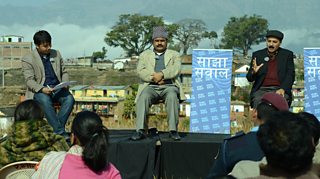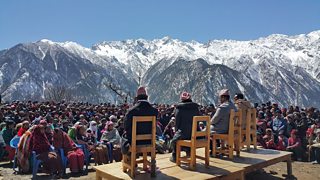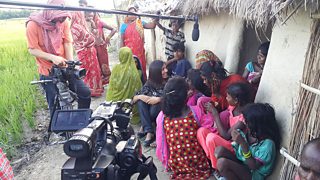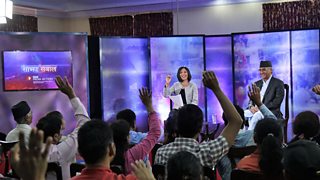No answers without questions: a decade of debate in Nepal
Pratibha Tuladhar
Senior Producer/Stakeholder Liaison, Βι¶ΉΤΌΕΔ Media Action, Nepal
Tagged with:
As Sajha Sawal broadcasts its 500th episode, the team members reflect on what the programme means to the Nepali audience – and them.
“Who will answer my questions? When will we experience respite? We’ve been quiet for a long time. Speak up. Change begins with you.”
These are words from the song composed by a group of young viewers. It’s a song about aspiring for a better future. Week after week our national television and radio debate programme has been a platform for people from all communities in Nepal to voice their hopes and urge the country’s leaders to make them a reality.
From the very beginning – about ten years and 500 episodes ago – Sajha Sawal broke new ground and got people talking.
“I clearly remember the first recording of Sajha Sawal in Biratnagar in 2007”, says senior producer Bhuwan Timilsina. “We created some ripples in the local media because we recorded with the sitting prime minister, the late Girija Prasad Koirala. With this first show, we set a precedent because it was the first time a prime minister had sat before the public, answering their questions directly.”
The episode was an engaging discussion on the future path of a country that had just stepped out of a decade-long civil war. People were anxious and questioned the prime minister for more than an hour.

Former presenter of Sajha Sawal, Narayan Shrestha, interviews panellists in Sindhuli district.
Sajha Sawal began life primarily as a radio programme, although the first three episodes were also broadcast on a private TV station - Kantipur Television. Before long they showed interest in broadcasting every programme and our 17th episode marked the start of a partnership that has seen Sajha Sawal broadcast on both TV and radio ever since.
The programme has been funded by a range of donors since it began: the United Nations Development Programme; the Norwegian Embassy in Nepal; the Australian Embassy in Nepal; the UK’s Department for International Development; and, currently, the Swiss Agency for Development and Cooperation. It has always been editorially independent with the Βι¶ΉΤΌΕΔ values of fairness and impartiality at its heart.
Over the years, the programme has been the first to cover crucial issues, including those faced by highly marginalised, rural communities in Nepal and Nepalis living abroad in deplorable conditions as migrant workers.
Sajha Sawal has recorded programmes in all 75 districts of Nepal, ensuring audiences at recordings are diverse and represent the voices of all communities rather than simply giving airtime to popular, media- savvy contributors.

The residents of Humla District at the recording of Sajha Sawal - the 75th district covered by the programme.
The team travels, from district to district, village to village, gathering evidence in people’s voices, ensuring people from all backgrounds have space to raise their queries directly with those governing the country.
The voices of the , considered ‘untouchable’ and therefore discriminated against, and members of the were heard for the first time on Sajha Sawal.
Programme Editor Dipak Bhattarai says this is what makes the programme stand out in the Nepali media market and makes it such a powerful way to make those in authority accountable. “I believe in questions. When you stop questioning there will be no transparency in democracy. So, people need to keep asking questions”, he adds.
Finding a diverse audience for the show is always a challenge says audience recruiter Sita BK: “But when the audience comes to you, they come to you with trust. And it becomes our job to protect that trust.”
Our presenter Bidhya Chapagain has interviewed Nepal’s first women president and the first woman Chief Justice— a rarity in Nepal’s journalism and political sector, which is largely male-dominated.
As a woman Bidhya has made it possible for other women to speak about issues they would not have felt able to with a male presenter. In 2015, the team walked two days to arrive at a remote village in Jajarkot district. She soon found herself sitting in the midst of around 15 women, who started talking to her about uterine prolapse. Every single one of them was a sufferer and they gravitated toward Bidhya with their stories. And it was the first time they had met a journalist! “Sometimes, it moves me to see how nervous and excited people are when they are asking questions. It is a very big deal for marginalised communities and women, who have never had such a chance before. But they muster the courage and you know that it means people seek change,” says Bidhya.

Bidhya Chapagain listening to women to discuss the issues they wouldn't be able to with a male presenter
The production team has faced many challenges over the years but creating an opportunity for ordinary people to get their voices heard has been hugely rewarding. “In the mountains, we have had to scrape snow off entire slopes, just ahead of the recording. In some districts, I remember waking up in tents with frozen fingers in the morning and thinking, this is why it is so important that I record the voices from these areas,” says the sound technician, Prakash Ghimire.
The opportunity to live among the was an opportunity to experience people’s frustration in the aftermath of the earthquake, but also see that suffering comes with hope. After the broadcast of the episode, the Chief Executive Officer of the National Reconstruction Authority, Govinda Raj Pokharel who was traveling with the team, took steps to make arrangements to resettle the community to a safer building location. And former minister, Agni Sapkota, who had promised on the programme, to organise a health camp in the region, went on to keep his words.
Just like the first episode, the 500th episode gave a mixed audience group a platform to seek answers from the prime minister – this time, Sher Bahadur Deuba.

People raise hands as Bidhya Chapagain conducts the 500th episode of Sajha Sawal with Prime Minister, Sher Bahadur Deuba, at the prime minister's official residence.
Hands are still being raised and people still have plenty of questions to dart at the authorities.
